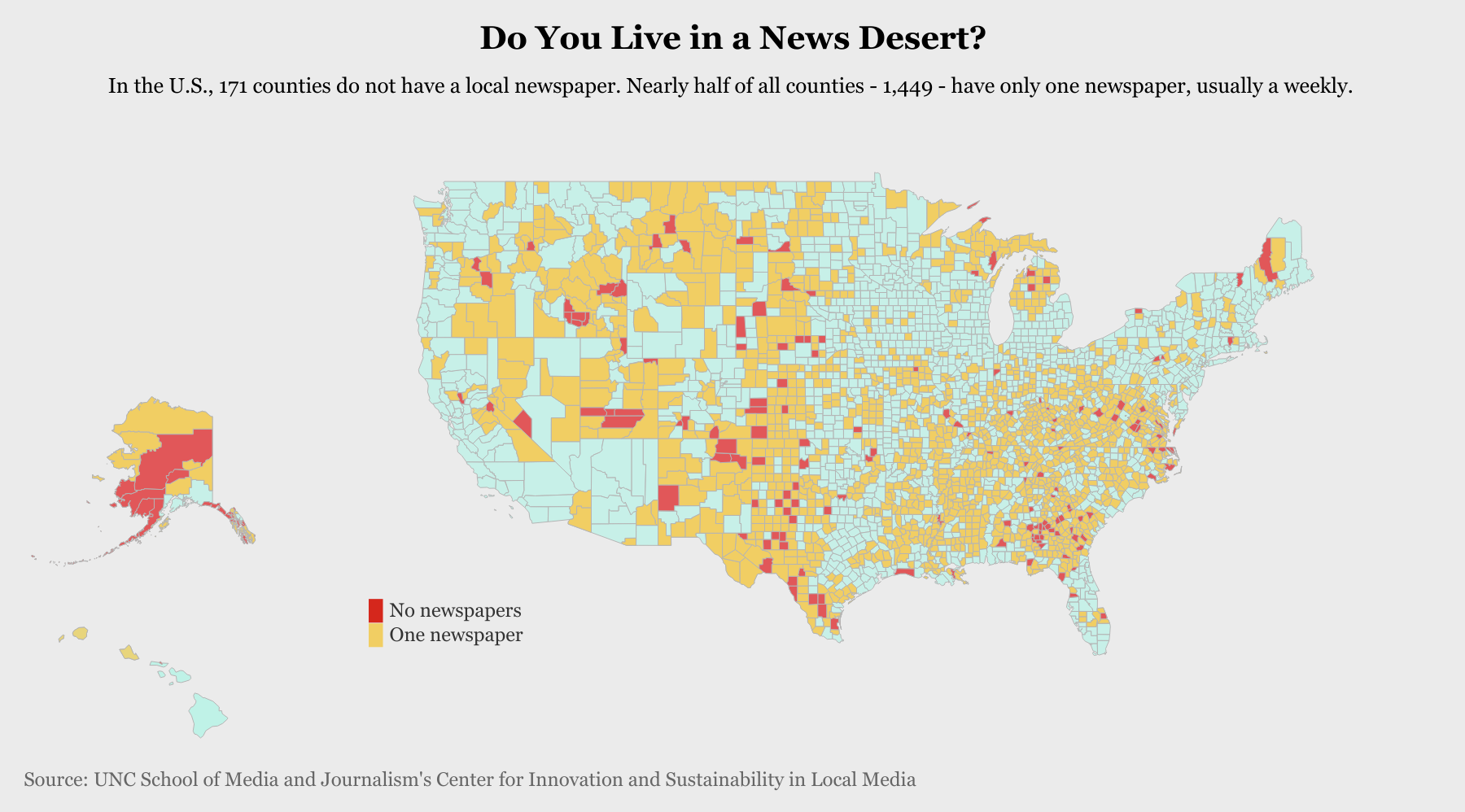Connecting state and local government leaders
Researchers identified nearly 200 counties without any paper, weekly or daily, “creating a news vacuum for about 3.2 million residents and public officials.”
More than one in five newspapers shut down in the last 15 years, leaving half of the country’s 3,143 counties with only one newspaper—typically a small weekly—to cover dozens of communities, according to new research from the University of North Carolina’s Center for Innovation and Sustainability in Local Media.
“The United States has lost almost 1,800 papers since 2004, including more than 60 dailies and 1,700 weeklies,” says “The Expanding News Desert,” a year-long study released this month. “Roughly half of the remaining 7,112 in the country—1,283 dailies and 5,829 weeklies—are located in small and rural communities. The vast majority—around 5,500—have a circulation of less than 15,000.”
The loss of local journalism ripples throughout a community, leading to less independent governmental oversight and lower levels of civic engagement. A 2011 report from the Federal Communications Commission found that local newspapers are adept at breaking down the major issues confronting communities and giving residents the information needed to solve problems.
Another study released this summer found that local governments ended up spending more to borrow money after a newspaper closure, while government inefficiencies increase. The authors concluded that their research suggests "that local newspapers are important for the health of local capital markets."
But in many communities, the economic support for newsgathering has dwindled. The UNC report notes that many areas lack the "digital or print revenue" to pay for the kind of public service journalism that newspapers provided. “Therefore, the fate of communities and the vitality of local news—whether delivered over the internet, the airwaves or in print—are intrinsically linked.”
Researchers at UNC have been tracking and quantifying the loss of newspapers across the country since 2016. Initially, that research was based on analysis of two industry databases that track newspapers, but the new report adds three layers of verification to determine the status of more than 9,000 newspapers, including information obtained from press associations and interviews with staff members at individual newspapers. The project, spearheaded by Penelope Muse Abernathy, the Knight Chair in Journalism and Digital Media Economics at UNC, includes an interactive map that allows users to examine the country's media landscape down to the county level.

Newspapers have shut down in every state. California lost 11 daily newspapers, the most in the country, ranging in circulation from 22,000 to 157,000 readers. Kansas lost seven, all with circulations less than 10,000. Illinois lost 157 weeklies, New York lost 155 and Texas lost 146. And the effects of those losses may be felt beyond just the communities where they published.
“The loss of newspapers in one state has the potential to affect residents in many other states, since government agencies often rely on local news reports to help identify and contain public health crises and assess the impact of natural and man-made disasters,” the report says. “Officials at the Centers for Disease Control and Prevention, for example, say that the death of newspapers throughout the country is already hindering their ability to spot and track the spread of disease, which could lead to outbreaks of more epidemics.”
In the absence of those local reports, CDC officials have attempted to track outbreaks via social media, which so far has been “much less reliable.”
The dramatic decrease in news outlets has led to more “news deserts,” defined as either a community without a local newspaper or a community where residents are “facing significantly diminished access to the sort of important news and information that feeds grassroots democracy.”
Researchers identified nearly 200 counties without any paper, weekly or daily, “creating a news vacuum for about 3.2 million residents and public officials.” An additional 1,449 counties have only one newspaper, “usually a weekly that may struggle to find the resources to cover dozens of other communities in that county.” More than 2,000 counties do not have a daily newspaper, leaving residents there to source daily news from social media or news outlets based in adjacent counties or far-away metropolitan areas.
“These distant news outlets … provide only sporadic coverage of these counties without a daily paper, and social media outlets are, invariably, an unreliable source,” the report says.
News deserts are most likely to pop up in areas that are already struggling. “The people with the least access to local news are often the most vulnerable—the poorest, least educated and most isolated,” the report says.
And surviving newspapers are, in most cases, shells of their former selves. Faced with budget shortages, most publications have dramatically scaled back staffing levels, leading to cutbacks in coverage of neighborhoods, rural areas and government. More than half of all newspapers have changed ownership in the past decade, and the largest 25 newspaper chains now own a third of all newspapers, including two-thirds of the country’s 1,200 dailies. Those arrangements typically leave management decisions, including budget oversight, to people who do not reside or work in the newspapers’ coverage areas.
“The consolidation in the industry places decisions about the future of individual papers, as well as the communities where they are located, into the hands of owners with no direct stake in the outcome,” the report says.
Entrepreneurs and media startups are experimenting with ways to replace the lost coverage traditionally provided by newspapers, but those models are largely centered around large metropolitan areas, the report notes.
Researchers outline a handful of lessons for publications hoping to buck the trend and survive in the changing media landscape, including investing in human capital (journalists and sales departments), diversifying revenue sources to rely less on print advertising, and having a strategy in place for transforming at least a third of their business model every five years.
“Their leaders establish five-year financial goals (for costs, revenue and profitability), and then identify and prioritize initiatives most likely to lead to long-term profitability and success, even if that means lower profit today,” they write.
Ensuring that local journalism survives is crucial for communities and for “trust in democracy at all levels,” the report says. "Through the stories they publish, local newspapers help us ‘understand how we are related to people we may not know we are related to.’ They also educate us, providing us with information to guide important decisions that will affect the quality of our own lives, as well as those of future generations. An entire community—even non-voters—benefits when voters make informed decisions about local candidates and policies.”
Kate Elizabeth Queram is a Staff Correspondent for Government Executive’s Route Fifty and is based in Washington, D.C.

NEXT STORY: Tough New DUI Law Brings Controversy



